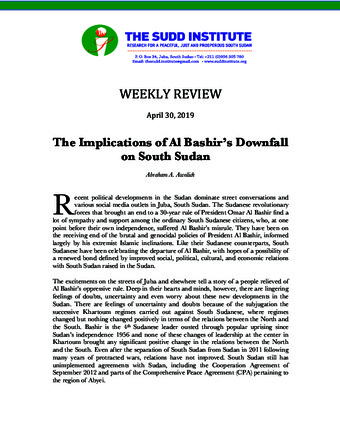The Implications of Al Bashir’s Downfall on South Sudan
Publication Summary
Recent political developments in the Sudan dominate street conversations and various social media outlets in Juba, South Sudan. The Sudanese revolutionary forces that brought an end to a 30-year rule of President Omar Al Bashir find a lot of sympathy and support among the ordinary South Sudanese citizens, who, at one point before their own independence, suffered Al Bashir’s misrule. They have been on the receiving end of the brutal and genocidal policies of President Al Bashir, informed largely by his extremist Islamic inclinations. Like their Sudanese counterparts, South Sudanese have been celebrating the departure of Al Bashir, with hopes of a possibility of a renewed bond defined by improved social, political, cultural, and economic relations with South Sudan raised in the Sudan.
The excitements on the streets of Juba and elsewhere tell a story of a people relieved of Al Bashir’s oppressive rule. Deep in their hearts and minds, however, there are lingering feelings of doubts, uncertainty and even worry about these new developments in the Sudan. There are feelings of uncertainty and doubts because of the subjugation the successive Khartoum regimes carried out against South Sudanese, where regimes changed but nothing changed positively in terms of the relations between the North and the South. Bashir is the 4th Sudanese leader ousted through popular uprising since Sudan’s independence 1956 and none of these changes of leadership at the center in Khartoum brought any significant positive change in the relations between the North and the South. Even after the separation of South Sudan from Sudan in 2011 following many years of protracted wars, relations have not improved. South Sudan still has unimplemented agreements with Sudan, including the Cooperation Agreement of September 2012 and parts of the Comprehensive Peace Agreement (CPA) pertaining to the region of Abyei.
The Cooperation Agreement addresses 8 matters, which form 8 agreements, that include (1) oil and related economic matters, (2) status of nationals in counterpart state, (3) border issues including demarcation, (4) central bank issues, (5) trade & related issues, (6) assets, liabilities, arrears & claims, (7) post services benefit (such as pensions), and (8) security arrangements. Most of 8 agreements in the Cooperation Agreement have hardly been implemented, with the exception of oil agreement to a certain degree. While most of the CPA was implemented, particularly protocol pertaining to the southern region, the Abyei Protocol and border demarcation clauses remain unimplemented. Abyei people were supposed to decide through a referendum whether they should join South Sudan or be part of Sudan.
Therefore, while Bashir’s ouster excites people, they are also uncertain of what follows next given the fact that several regimes have been changed in the Sudan since 1956 but no concrete positive change has come to the periphery of the Sudan. So, people want to know whether things would change for the better or it would be business as usual. One inescapable question in the minds of many South Sudanese is what the change of guard in the Sudan represents in terms of its relationship with South Sudan. Another question pertains to the impact Al Bashir’s departure has on the Peace Agreement he helped the South Sudanese belligerents signed in September last year.
This paper seeks to answer these questions in order to provide a concise view on the political dynamics in Sudan as seen from across the southern border. The hope is that this analysis could help us better understand the mixed feelings euphoria, worry, and fear generated by the on-going developments in Sudan. It is apparent that citizens in both countries are concerned by the situation given that the events remain fluid and precarious, as the actors remain divided on the way forward. One particularly important matter of concern is the possibility of Al-Bashir’s allies infiltrating the transitional government.
This review starts with highlights into key developments leading to the fall of President Bashir, followed by a look into subsequent events. The second section looks at potential challenges and opportunities in this crisis as regards the relationship between Sudan and South Sudan. The review concludes with a number of recommendations.
Abraham Awolich is the former Managing Director of the Sudd Institute. Awolich’s research has focused on management of development organizations working in conflict mitigation, governance and business management. Awolich is the co-founder of the Sudan Development Foundation and the former Executive Director of New Sudan Education Initiative (NESEI). Previous to joining the Sudd Institute, Awolich helped establish a secondary school in Yei and a medical clinic in Kalthok, Awerial County. Awolich has a Master’s Degree in Pubic Administration from the Maxwell School of Citizenship and Public Affairs at Syracuse University and Bachelor’s Degree from the University of Vermont in Anthropology and Business Administration. Awolich is a McNair Scholar and winner of the prestigious Samuel Huntington Public Service Award in 2006.

